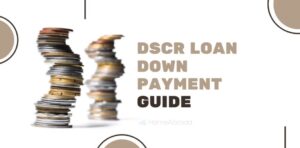Hamoraon.com – Are you considering applying for a DSCR loan but unsure about the down payment requirements? Look no further! In this article, we will provide you with a comprehensive guide to understanding the ins and outs of DSCR loan down payments. Whether you are a first-time buyer or a seasoned investor, this information will prove invaluable in making informed decisions.
Before diving into the nitty-gritty details, let’s briefly discuss what a DSCR Loan Down Payment. DSCR stands for Debt Service Coverage Ratio, and it is a financial metric used by lenders to assess a borrower’s ability to repay a loan. Unlike traditional mortgages, DSCR loans primarily focus on the cash flow generated by the property rather than the borrower’s personal income. This makes them an attractive option for real estate investors or those looking to purchase income-generating properties.
Understanding DSCR Loan Basics
In this section, we will break down the basics of DSCR Loan Down Payment, discussing their eligibility criteria, advantages, and potential drawbacks. Whether you are new to DSCR loans or need a refresher, this section will provide you with a solid foundation.
DSCR Loan Eligibility Criteria
Before applying for a DSCR Loan Down Payment, it’s crucial to understand the eligibility criteria set by lenders. Typically, lenders require borrowers to have a minimum credit score, a certain level of cash reserves, and a proven track record of managing income-generating properties. Additionally, lenders may also consider the property’s occupancy rate and the borrower’s debt-to-income ratio. We will guide you through these criteria and help you determine if you meet the requirements.
Advantages of DSCR Loans
DSCR loans offer several advantages compared to traditional mortgages. Firstly, they focus on the property’s cash flow rather than the borrower’s personal income, making it easier for real estate investors to qualify. Secondly, DSCR Loan Down Payment often offer higher loan amounts, allowing investors to purchase properties with a higher income potential. Lastly, DSCR loans typically have more flexible underwriting guidelines, making them accessible to a wider range of borrowers. We will explore these advantages in more detail and help you understand how they can benefit your investment goals.
Potential Drawbacks of DSCR Loans
While DSCR loans have their advantages, it’s essential to consider the potential drawbacks as well. One significant drawback is the higher interest rates associated with these loans. Since they carry more risk for lenders, they often come with higher interest rates compared to conventional mortgages. Additionally, the stricter underwriting guidelines may require a more extensive documentation process, which can be time-consuming. We will discuss these drawbacks and provide insights into how you can mitigate their impact.
The Importance of Down Payments
Learn why down payments play a crucial role in DSCR loan applications and how they affect the overall loan terms. Discover the factors that lenders consider when determining down payment requirements and how you can strategically plan for a successful loan application.
The Role of Down Payments in DSCR Loans
Down payments are an essential component of DSCR loans and can significantly impact your loan terms. Lenders use down payments as a measure of the borrower’s commitment to the investment and as a way to mitigate risk. A larger down payment generally results in more favorable loan terms, such as lower interest rates and higher loan amounts. We will delve deeper into the role of down payments and help you understand how they can influence your loan terms.
Factors Affecting Down Payment Requirements
Several factors determine the down payment requirements for DSCR loans. Some of the key factors include the type of property, the loan amount, and the borrower’s creditworthiness. For example, lenders may require a higher down payment for commercial properties compared to residential properties. Additionally, borrowers with a lower credit score may be subject to higher down payment requirements. We will explore these factors in detail and provide you with insights into how you can plan your down payment accordingly.
Strategic Planning for Down Payments
Planning your down payment strategically can help you secure more favorable loan terms and increase your chances of loan approval. One approach is to save for a larger down payment to decrease the loan-to-value ratio, which can lead to lower interest rates. Another strategy is to improve your credit score, as a higher score can potentially lower your down payment requirements. We will share practical tips and strategies to help you plan your down payment strategically and maximize your chances of a successful loan application.
Minimum Down Payment Requirements
Find out the typical minimum down payment requirements for DSCR loans and how they differ from conventional mortgages. Gain insight into the factors that influence these requirements, such as the property type, loan amount, and borrower’s creditworthiness.
Minimum Down Payment Guidelines
While down payment requirements can vary depending on the lender and specific circumstances, there are general guidelines that borrowers can follow. Typically, DSCR loans require a minimum down payment of 20% to 30% of the property’s purchase price. However, certain factors, such as the property type and borrower’s creditworthiness, can influence these requirements. We will provide you with a comprehensive overview of the minimum down payment guidelines and help you understand how they apply to your unique situation.
Factors Influencing Down Payment Requirements
Various factors can influence the down payment requirements for DSCR loans. Firstly, the type of property plays a significant role. Commercial properties often require a higher down payment compared to residential properties due to their higher risk profile. Additionally, the loan amount can influence the down payment requirements, with larger loan amounts typically requiring a higher down payment percentage. Lastly, the borrower’s creditworthiness and financial history can impact the down payment requirements. We will explore these factors in detail and provide you with a comprehensive understanding of how they can influence your down payment requirements.
Adjusting Down Payments for Favorable Loan Terms
While there are minimum down payment requirements, borrowers can choose to make a higher down payment to potentially obtain more favorable loan terms. Making a larger down payment can result in a lower loan-to-value ratio, which can lead to lower interest rates and higher loan amounts. However, it’s essential to assess your financial situation and investment goals before deciding on the down payment amount. We will guide you through the process of adjusting your down payment to achieve the most favorable loan terms while considering your financial objectives.
Strategies for Saving for a DSCR Loan Down Payment
If you are concerned about saving for a DSCR loan down payment, this section is for you. We will provide you with practical tips and strategies to help you accumulate the required funds efficiently. From budgeting to exploring alternative financing options, we’ve got you covered.
Creating a Down Payment Savings Plan
Developing a savings plan specifically for your DSCR loan down payment can help you stay on track and reach your goal faster. Start by assessing your current financial situation and setting a realistic target amount for your down payment. Then, create a budget that allows you to save a portion of your income regularly. We will provide you with actionable tips for creating a down payment savings plan and help you stay motivated throughout the process.
Reducing Expenses and Increasing Income
When saving for a down payment, it’s crucial to find ways to reduce expenses and increase your income. Look for areas where you can cut back on discretionary spending and redirect those funds towards your down payment savings. Additionally, consider exploring side hustles or part-time work to supplement your income. We will share creative ideas for reducing expenses and increasing your income to accelerate your down payment savings.
Exploring Alternative Financing Options
If traditional savings methods are not feasible for you, exploring alternative financing options can help you bridge the gap between your savings and the required down payment amount. Some options to consider include borrowing from family or friends, utilizing a home equity line of credit (HELOC), or exploring down payment assistance programs. We will discuss these alternative financing options in detail and help you determine which option best suits your needs.
Utilizing Government Programs and Grants
There are various government programs and grants available that can assist homebuyers with their down payment requirements. For example, the Federal Housing Administration (FHA) offers low down payment options for eligible borrowers. Additionally, some states and local governments provide down payment assistance programs or grants to help individuals achieve homeownership. We will guide you through these programs and grants, explaining their eligibility criteria and application process.
Exploring Down Payment Assistance Programs
Did you know that there are various down payment assistance programs available for DSCR loans? Learn about these programs and how they can help you bridge the gap between your savings and the required down payment amount. We will guide you through the eligibility criteria and application process.
Types of Down Payment Assistance Programs
Down payment assistance programs come in various forms, including grants, loans, and second mortgages. Grants provide funds that do not require repayment, while loans and second mortgages offer additional financing options that need to be repaid over time. We will explore the different types of down payment assistance programs available and help you understand their pros and cons.
Eligibility Criteria for Down Payment Assistance
Each down payment assistance program has its own set of eligibility criteria. Some programs have income limits, while others may require borrowers to complete homeownership education courses.
Application Process for Down Payment Assistance
To apply for down payment assistance programs, you will typically need to complete an application and provide supporting documentation. The application process may involve verifying your income, assets, and credit history. Additionally, some programs may require you to attend homeownership education courses. We will guide you through the application process and provide tips for a smooth and successful application.
Benefits and Limitations of Down Payment Assistance Programs
Down payment assistance programs can be a valuable resource for homebuyers, but it’s essential to understand their benefits and limitations. Some of the benefits include reducing the upfront cost of homeownership and increasing affordability. However, these programs may have limitations, such as income restrictions or a limited pool of funds. We will provide an in-depth analysis of the benefits and limitations of down payment assistance programs, helping you make an informed decision.
The Impact of Down Payments on Loan Terms
In this section, we will delve into the relationship between down payments and loan terms. Understand how a higher down payment can potentially lead to more favorable interest rates, loan amounts, and loan-to-value ratios. We will also discuss how down payments can affect your cash flow and return on investment.
Lowering Interest Rates with a Larger Down Payment
One significant advantage of making a larger down payment is the potential to secure lower interest rates. Lenders view larger down payments as a lower risk, which could result in a reduced interest rate on your loan. We will explain the mechanics behind this relationship and help you understand how a larger down payment can save you money over the life of your loan.
Increasing Loan Amounts with a Larger Down Payment
A larger down payment can also increase the loan amount you qualify for, allowing you to purchase a more expensive property or invest in additional income-generating assets. By reducing the loan-to-value ratio, lenders may be more willing to approve a larger loan amount. We will provide examples and scenarios to illustrate how increasing your down payment can expand your investment opportunities.
Impact on Loan-to-Value Ratio
The loan-to-value (LTV) ratio is a crucial metric that lenders use to assess risk. A higher down payment results in a lower LTV ratio, which can lead to more favorable loan terms. Lower LTV ratios often result in lower interest rates, reduced mortgage insurance requirements, and increased flexibility in loan structure. We will explain the relationship between down payments and LTV ratios and help you understand how to leverage this to your advantage.
Considerations for Cash Flow and Return on Investment
When determining your down payment amount, it’s important to consider its impact on your cash flow and return on investment. A larger down payment reduces your monthly mortgage payment, resulting in improved cash flow. Additionally, a higher cash investment upfront can potentially lead to higher returns in the long run. We will discuss these considerations in detail, allowing you to make a well-informed decision that aligns with your financial goals.
Pros and Cons of Different Down Payment Amounts
Explore the advantages and disadvantages of different down payment amounts. We will analyze scenarios with low, moderate, and high down payments, helping you make an informed decision based on your financial goals and risk tolerance.
Advantages of a Low Down Payment
Opting for a low down payment allows you to preserve more cash for other investments or emergencies. It may also provide the opportunity to enter the real estate market sooner. However, there are potential drawbacks to consider, such as higher interest rates, mortgage insurance requirements, and a higher loan balance. We will explore the advantages and disadvantages of a low down payment to help you assess if it aligns with your financial circumstances.
Advantages of a Moderate Down Payment
A moderate down payment strikes a balance between preserving cash and reducing the loan amount. This approach can result in more favorable loan terms compared to a low down payment while still providing some flexibility in allocating funds elsewhere. We will discuss the advantages of a moderate down payment and help you understand how it can enhance your overall financial position.
Advantages of a High Down Payment
Opting for a high down payment offers several advantages, such as lower interest rates, reduced mortgage insurance costs, and increased loan eligibility. It can also provide a greater sense of security and reduce the risk of being in a negative equity position. However, tying up a significant amount of cash in the down payment may limit your liquidity and other investment opportunities. We will explore the advantages and considerations of a high down payment to help you determine if it aligns with your financial goals.
Creative Financing Options for Down Payments
If you are looking for alternative ways to fund your DSCR loan down payment, this section will provide you with creative financing options. From partnerships and private lending to utilizing retirement funds, we will explore unconventional strategies to help you secure the necessary funds.
Partnering with Other Investors
Teaming up with other investors can be an effective way to pool resources and increase your down payment. By partnering with like-minded individuals, you can share the financial burden and expand your investment opportunities. We will guide you through the process of finding suitable partners and establishing mutually beneficial agreements.
Exploring Private Lending Options
Private lenders can offer alternative financing options for your down payment. These lenders may be more flexible in their requirements and can provide funds based on the value of the property or other collateral. We will discuss the benefits and considerations of private lending and provide guidance on finding reputable lenders.
Utilizing Retirement Funds
If you have retirement savings, you may be able to tap into those funds to cover your down payment. Certain retirement accounts, such as a self-directed individual retirement account (IRA), allow for real estate investments. We will explain the process of utilizing retirement funds for your down payment and highlight the potential tax implications and risks involved.
Considering Seller Financing
Seller financing is an arrangement where the property seller acts as the lender and provides financing for the buyer. This option can be beneficial if the seller is open to negotiating the down payment terms. We will explore the advantages and considerations of seller financing and provide guidance on initiating and structuring such agreements.
Negotiating Down Payments with Sellers
Discover effective negotiation techniques to potentially lower your down payment amount. We will share tips on how to approach sellers and leverage your position as a buyer to negotiate favorable down payment terms. Empower yourself with the knowledge to navigate these negotiations confidently.
Researching Market Conditions and Seller Motivation
Prior to negotiating the down payment with a seller, it’s crucial to research market conditions and understand the seller’s motivation. By gathering information about comparable properties and assessing the seller’s level of urgency, you can gauge the feasibility of negotiating the down payment. We will provide strategies for conducting market research and identifying seller motivations.
Presenting a Strong Offer
When making an offer, it’s important to present a strong and appealing proposal to the seller. This includes demonstrating your financial readiness, highlighting your commitment to the property, and showcasing your ability to close the deal. We will guide you through the process of presenting a compelling offer that increases the likelihood of negotiating a favorable down payment.
Exploring Seller Concessions
Seller concessions are terms or financial incentives offered by the seller to the buyer. These concessions can include assistance with closing costs, repairs, or even a reduction in the down payment requirement. We will discuss different types of seller concessions and provide tips on how to negotiate for them effectively.
Working with Real Estate Professionals
Real estate professionals, such as agents and brokers, can offer valuable insights and negotiation expertise when it comes to down payment discussions. They have experience in navigating these negotiations and can provide guidance on how to best approach sellers. We will discuss the benefits of working with real estate professionals and how they can support you throughout the negotiation process.
Frequently Asked Questions about DSCR Loan Down Payments
In this final section, we will address common questions and concerns regarding DSCR loan down payments. From clarifying misconceptions to providing expert advice, we aim to cover all the bases and ensure you have a clear understanding of this crucial aspect of DSCR loan applications.
Can I use gift funds for my DSCR loan down payment?
Gift funds can be used for DSCR loan down payments, but there are specific guidelines and requirements that must be followed. We will explain the rules surrounding gift funds and provide guidance on how to properly document and utilize them.
Are there any down payment assistance programs for DSCR loans?
While down payment assistance programs are more commonly associated with traditional mortgages, there may be options available for DSCR loans as well. We will discuss the availability of down payment assistance programs for DSCR loans and provide information on how to access these resources.
What happens if I can’t meet the minimum down payment requirements?
If you are unable to meet the minimum down payment requirements for a DSCR loan, there are alternative financing options and strategies to consider. We will explore these options and provide guidance on how to navigate the process effectively.
Can I negotiate the down payment requirements with the lender?
While down payment requirements are typically set by lenders based ontheir internal policies and risk assessment, it is possible to negotiate certain aspects of the down payment with the lender. For example, if you have a strong credit history or a significant amount of cash reserves, you may be able to negotiate a lower down payment requirement. We will provide tips on how to approach these negotiations and increase your chances of a favorable outcome.
Is it possible to finance the down payment?
Financing the down payment is an option that some borrowers may consider. However, it’s important to understand the implications and potential risks associated with this approach. Financing the down payment can result in additional debt and higher overall costs due to interest payments. We will discuss the pros and cons of financing the down payment and help you make an informed decision based on your financial situation.
Can I use a combination of personal funds and a down payment assistance program?
In many cases, borrowers can combine personal funds with down payment assistance programs to meet the required down payment amount. This can help reduce the burden of the down payment while still ensuring that you meet the lender’s requirements. We will provide guidance on how to navigate this process and maximize the benefits of combining personal funds with down payment assistance.
What other costs should I consider besides the down payment?
While the down payment is a significant upfront cost, it’s important to consider other expenses associated with purchasing a property. These costs may include closing costs, appraisal fees, inspection fees, and potential renovation or repair costs. We will provide a comprehensive overview of the additional costs involved in a DSCR loan transaction to help you budget effectively.
How can I ensure that my down payment funds are secure?
When making a down payment, it’s crucial to ensure that your funds are secure and protected. This involves choosing reputable lenders, working with trusted intermediaries, and understanding the necessary documentation and processes. We will provide tips on how to protect your down payment funds and minimize the risk of fraud or mismanagement.
In conclusion, understanding the intricacies of DSCR loan down payments is essential for any individual considering this financing option. By following the comprehensive guide provided in this article, you will gain the knowledge and insights needed to navigate the DSCR loan application process confidently. Remember, a well-informed borrower is more likely to make sound financial decisions, so arm yourself with the information you need and embark on your DSCR loan journey with confidence.



